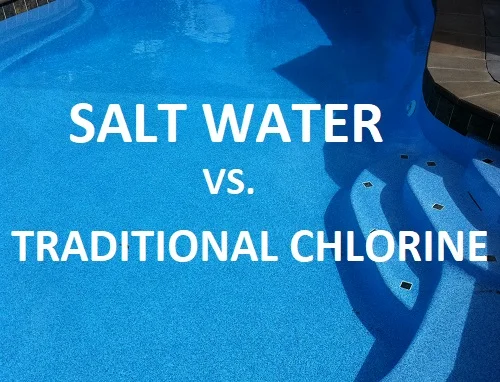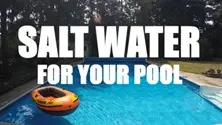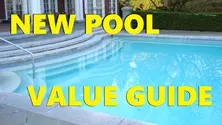Salt Versus Traditional Chlorine Pools
SwimmingPoolSteve.com is user-supported. In order to keep this resource about pools and spas available for free to all readers I earn commissions for purchases made through links on this page. For more information see the full disclaimer page. By using this website you are agreeing to the terms and conditions.

To salt, or not to salt: that is the question. This must be one of the single most commonly asked questions by both owners of existing pools as well as new pool owners also. Should you go with salt water or stick with traditional chlorine for your pool. I hope that by the end of this page you have enough information to confidently make an informed decision about this for your pool. Really it is not all that hard of a question to answer. There is no right or wrong answer. Salt will be good if your priorities for this pool / pool experience align with what a salt system can do for you. Or you might have priorities that are more in line with the benefits of traditional chlorine based treatments. Let's look at some of the considerations for each.
A quick note before we jump into breaking down salt water chlorine versus traditional chlorine. You need to be aware every pool is unique. You will not find a definitive answer whether salt is a good idea or not because it will depend on what you consider to be important. Also, it is hard to give specific advice that would apply to every swimming pool situation so please take the information on this page with a grain of salt. Get it? Because we are talking about salt water chlorine pools? A grain of salt...what you don't like my puns? Don't be so salty. You are being so dumb (So D um)....DAD STAAAHHP!

Main difference between salt and traditional chlorine - The main difference between chlorine from salt water versus traditional chlorine treatments is where you are getting your chlorine from. Simple enough. Sodium chloride (salt) can be used to generate chlorine (via electrolysis) directly within your swimming pool. Alternatively you can buy a chlorine product that someone else made from sodium chlorine (or calcium). So right away you can see that there is a lot of similarity between these two options. One you make your own chlorine and the other you let someone else do that and then you buy a bucket or jug of chlorine from them. Most commonly liquid chlorine, chlorine pucks / chlorine tabs or granular chlorine powder. There are a few details that we need to unpack here so you can have a more clear picture of the comparison between chlorine and salt water. One is the pH of the chlorine products you use. Another is the question (problem) of stabilized chlorine. Finally is the question about which chlorine option is best for the pool. This are three points of comparison right away that you can consider aside from price but it is worth noting that the price comparison alone might be enough to sway a pool owner one way or another so we can look at that as well.
Water chemistry and pH - The pH of your water is important which I think a lot of pool owners know already however I think even still water pH remains as the most undervalued variable that you need to monitor in your water. When you maintain your pH incorrectly this will almost certainly cause (or greatly contribute to) either scaling or corrosion issues with your pool and pool equipment. Even marginally poor pH management can add up over time to equal more cleaning costs, more repair costs and more equipment costs. So it should be a great concern to pool owners that salt pools tend to have a high pH due to the process of generating chlorine from salt water. Chronically high pH is one of the most common complaints from salt pool owners through it warrants mentioning that not all pools will have this problem. Some pools have minimal problems with high pH and salt systems, and some pools have no problems at all. How this could be you might wonder? If you have trees that drip acidic water into the pool regularly then this is going to counteract the tendency of pH creep upwards. Additionally the total alkalinity that you choose to maintain also makes a difference. The higher the alkalinity the more resistant to pH fluctuations. You also have optional things you can use to help further limit pH drifting like borates at 30 to 50ppm. So water chemistry is important, and pH one of the most important chemistry variables. And salt water chlorine probably will increase your pH, but so will other options as well. Liquid chlorine is one of the best options for maintaining swimming pools but it does also have a very alkaline pH at 13.0. In the other direction some chlorine product have a very low pH which causes problems in the other direction. Trichlor chlorine pucks have a pH of 3.0 so pools maintained using these pucks would have a low pH problem more than a high pH problem. Dichlor pucks are more neutral at a more neutral pH of 7.0 but they have their own problems with a high concentration of stabilizer. The takeaway here is that the warnings about salt water problems are well founded, but the alternatives all have similar concerns as well.
The problem with stabilized chlorine - In the last example we identified dichlor chlorine pucks as a great option as it has less of a negative effect on the pH of the water however the high concentration of stabilizer poses a problem. Stabilizer, or cyanuric acid, should be maintained at 30 to 50 ppm in a swimming pool to help the chlorine to resist the degrading effects of the sun. Without stabilizer any chlorine that you add to your pool would be burned off by the sun and you would have no chlorine by the end of the day. The fact that bromine is not able to be stabilized is one of the main reasons (other than cost) that you do not see bromine used in outdoor pools. There is a relationship between chlorine in stabilizer and you can tell this because it works to stop the sun from degrading the chlorine. But what happens if you have too much stabilizer? The end result is that the chlorine is bound and unable to function as intended. The relationship between chlorine and stabilizer is complicated but a simple takeaway is that free chlorine should be between 5% to 7.5% of the stabilizer level, depending on who you ask. With a normal range of 30 to 50 ppm of CYA this would be free chlorine needs to be 1.5ppm to 2.5ppm (for 5% concentration) or 2.25ppm to 3.75ppm (7.5% concentration). So what happens when you use only stabilized chlorine and your CYA levels climb up to 100 or 150ppm or more? At 150ppm CYA you would need 7.5ppm to 11.25ppm to meet the 5% to 7.5% concentration. Sounds like a lot to me. However as I understand it I do not believe it is a problem to have this, but I admit this level of chemistry is well over my head. I can only tell you that if you have high CYA and you don't increase your free chlorine levels in ratio with this you can expect to have green water shortly. Seasonal swimming pools that partially drain and refill every year tend to have less problems with high CYA levels because the water is being replaced with fresh water so often. Areas with permanently operating pools and water restrictions that prevent draining and refilling of pools need to be most mindful about whether you are using stabilized chlorine or not. Liquid chlorine, chlorine from salt water and cal-hypo chlorine (tabs or granular) are the best non stabilized options for adding chlorine to your pool water.
Price comparison between chlorine and salt water - The fact that you no longer need to buy and use chlorine for maintaining your pool levels has traditionally been used as a selling point for salt water systems. What you spend on the system you will save on chorine anyway, as the sales pitch goes. It is not entirely without merit either. You still need to buy chlorine, for one. A salt system maintains chlorine levels. Initial bringing up of the chlorine levels, plus periodic breakpoint chlorination should both be accomplished by exogenous chlorine chemical treatments. So you save on chlorine but not entirely. Also you spend more on acid than you used to (for lowering pH) as well as the high likelihood that you end up using scale and stain treatments regularly as you are borderline in a Langelier scaling state chronically. These costs balance out the "savings" you will experience buying chlorine. Besides chlorine is not all that expensive. Huh? Pardon me, what did you say? Chlorine prices have risen by hundreds of percent since the pandemic started?? Are you serious?? Well, I guess we can add a new advantage here for salt water pool owners. Since you generate your own chlorine so long as your salt cell does not fail you will be able to have clean and safe water in your pool while people buying chlorine fight each other in Walmart parking lots across America for the last bucket of tabs. So that...is something to consider. I suppose it also is worthwhile to mention the shocking increase in the cost of pool equipment, like salt chlorine generators for example. Not to mention backorder items weeks and months on delay. At the end of the day as a pool owner I think I would just sleep better at night knowing that I can generate a few years worth of the chlorine that I need. The cost to chlorinate a pool manually is surely less than the cost to buy and have installed a salt system, but the price I think is close enough now, especially with aggressive increases in the price of chlorine recently, to at least consider what price and availability of chlorine for your pool will look like in 3 to 5 years (the average life for a salt cell).
With all of that being said we can now move on to the question of whether salt will damage your pool or not. Yes, as I have written about extensively in articles like this: Get informed about salt water pools increasing the salt content in your water has the potential to cause damage. At least you could say cause damage at a faster rate than if you did not add 3000ppm of salt to your water. The salt in and of itself does not automatically destroy your pool but more so that ignorance of your water chemistry and water balancing will have more likely and more severe ramifications. With a little luck a traditional chlorine pool might achieve a stasis-like chemical balance where fairly little intervention is needed by yourself other than maintaining free chlorine. With a salt pool you almost certainly will have to take the time to learn pH and alkalinity balancing or else the pH is likely to be too high. The water will still look and feel good, so you might not really think it is a problem at all. But eventually you will have problems. The solution is not to avoid salt water, in my opinion. The solution is to understand how salt systems can affect your chemistry levels and how you need to be diligent about keeping your chemical parameters within the correct range.
If you skip salt water because you don't want to hurt your pool and then proceed to pile chlorine pucks into your pool skimmer then you have failed to make an informed decision about salt water. When you understand the importance of managing your water regardless of where you get your chlorine from you will be ready to make an informed decision about salt water...at least as far as the pool and equipment goes. Natural stone and concrete surfaces is another consideration. Many pool builders now refuse to install salt systems due to damage to decking and natural stone. Certainly a concern. If you have a regular concrete deck and you would not care if there was a white salt stain / splash on your pool deck then I am less concerned about salt. If you had imported italian bluestone decking imported for your pool deck then I am definitely saying to pass on salt water. Even though most of the reported problems are about staining and not physical damage, some stone can actually be damaged by salt water absorbing in and then crystalizing when it dries causing spawling of the surface. There is no right answer about salt water versus traditional chlorine. Only the right answer for you and your unique situation. For many pool owners it ultimately just boils down to the convenience of salt water being appealing and this is enough for most people to make the jump to salt water. There is a reason why salt systems are as popular as they are (and have been for decades now) despite having some legitimate drawbacks. Salt is pretty darned convenient and it does feel nicer on the skin.
Need more info on salt pools? You might be interested in this advice about salt water pools
Top content from www.SwimmingPoolSteve.com
Pool and spa chemistry crash course
New pool owner guide
The Swimming Pool Steve blog
Have a question - ask Steve

Swimming Pool Steve is an award winning, second generation swimming pool specialist from Ontario Canada and one of the most trusted voices in the swimming pool industry. With over 20,000,000 views on the Swimming Pool Steve YouTube Channel, winner of the Pleatco Pool & Spa Industry Leadership award and author of hundreds of pool and spa articles both online and in print. Steve is committed to helping pool and spa owners as well as pool and spa industry workers learn more about the technical side of building, renovating, repairing and maintaining all types of swimming pools and spas. Follow Swimming Pool Steve on Facebook, Twitter and YouTube.
Paid PDF Books From Swimming Pool Steve
 Steve's Pool Survival Guide
Steve's Pool Survival Guide
The Swimming Pool Steve Pool Survival Guide is intended to help pool owners understand their pool and pool equipment better, understand water chemistry, water testing and chemical corrections to the water, troubleshoot the most common pool problems and have confidence in interacting and caring for their pool in the fastest possible frame of time. Also covers pool safety, things to avoid and how to operate your pool more efficiently.
 Salt Water Recommendations
Salt Water Recommendations
Are you considering upgrading to salt water in your pool? In this paid PDF Steve talks about which pools should avoid using salt water. Find out concerns about using salt in your pool but also the potential benefits of salt water. Finally hear which specific brand and model of salt chlorine generator Steve thinks is the best option currently available to pool owners and how to choose the right size salt system for your pool.
 New Pool Heater Buyer's Guide
New Pool Heater Buyer's Guide
In this guide Swimming Pool Steve will help you to better understand your heater options as well as which would be best suited for your pool. Learn about BTU output and sizing of both gas/propane heaters as well as electric heat pumps for residential swimming pools. You will also learn about which specific brands and models of currently available pool heaters Steve likes to recommend. If you are thinking of adding a new pool heater to your equipment pad this buyer's guide would be a useful resource to help you make a more informed buying decision.
 New Pool Installation Value Guide
New Pool Installation Value Guide
This is a value shopping guide written by Swimming Pool Steve to help home owners hiring for a new pool installation to get the maximum value for their investment with tips about how to protect your interests during the vetting, hiring and pool installation process. Anyone serious about having a pool installed will find value in this guide. Pool installers will sell the pool package that is best for them - not for you! Become an informed value shopper with this PDF guide.
Endorsed Brands From Swimming Pool Steve
The following links and products are to affiliates of the Swimming Pool Steve website. These are brands, products and services hand selected by Steve for endorsement. Please note that these endorsements can include monetary compensation, affiliate links and referral fees to Swimming Pool Steve, however there is zero additional cost to you should you use one of these products or services. Income generated from these links helps to keep this pool and spa resource available for everyone. To have your product or service considered for listing here as an endorsed brand email SwimmingPoolSteve@gmail.com.
Amazon Disclosure Statement - As an Amazon Associate I earn from qualifying purchases.

www.PoolPartsToGo.com
New Black + Decker variable speed pumps are available online from www.PoolPartsToGo.com and they are a drop in replacement for many popular pump models including Pentair Superflo and Hayward Super Pumps. With an adjustable platform base, union connections included and a very strong warranty these pumps offer an impressive value to pool owners.
- Swimming Pool Steve
